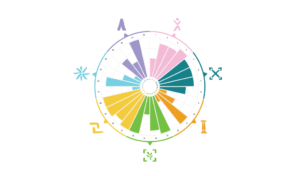Daily tools empower your wellness journey
Each person’s wellness journey is unique. With that in mind, DBSA has developed tools to help you take the first steps and to determine what support you may need along the way.
Start with Strengths
The DBSA Wellness Wheel is an easy-to-use tool that focuses on your strengths in 7 key areas of life.
Keep Daily Logs
Our Wellness Tracker can be an essential resource to understand your moods, symptoms, medications, and lifestyle.

Getting Well and Staying Well
Depression and bipolar disorder are mood disorders—real conditions that affect a person’s moods, thoughts, body, energy, and emotions. Both conditions, especially bipolar disorder, tend to follow a cyclical course of ups and downs. Treatment for these conditions can also have ups and downs. Wellness may not happen overnight, but it is possible.
You Decide What Wellness Means to You
Relief of symptoms is only the first step in treating depression or bipolar disorder. Wellness is a return to a life that you care about. Recovery happens when your condition stops getting in the way of your life. Talk to your health care provider (HCP) about what you need to achieve this recovery. Your HCP can provide the treatment(s) and/or medication(s) that work best for you. Along the way, you have a right to ask questions about the treatments you are receiving and choose the treatments you want.
It can also be helpful to work with a therapist, family member, friend, or peer supporter to help define your experience in health. Your definition of a meaningful life may change over time. At times, depression and bipolar disorder might make it seem difficult to set a goal for yourself. It might feel almost impossible to think about the things that you hope for or care about. But goal setting is an important part of wellness, no matter where you are on your path. Work on what you can and when you can.
Effective treatments can help you
- reach your goals (for example, by helping reduce symptoms such as fear or anxiety),
- build upon the strengths you have and the things you can do,
- develop a wellness plan focused on your specific goals and needs, and
- live your life without the interference of symptoms.





